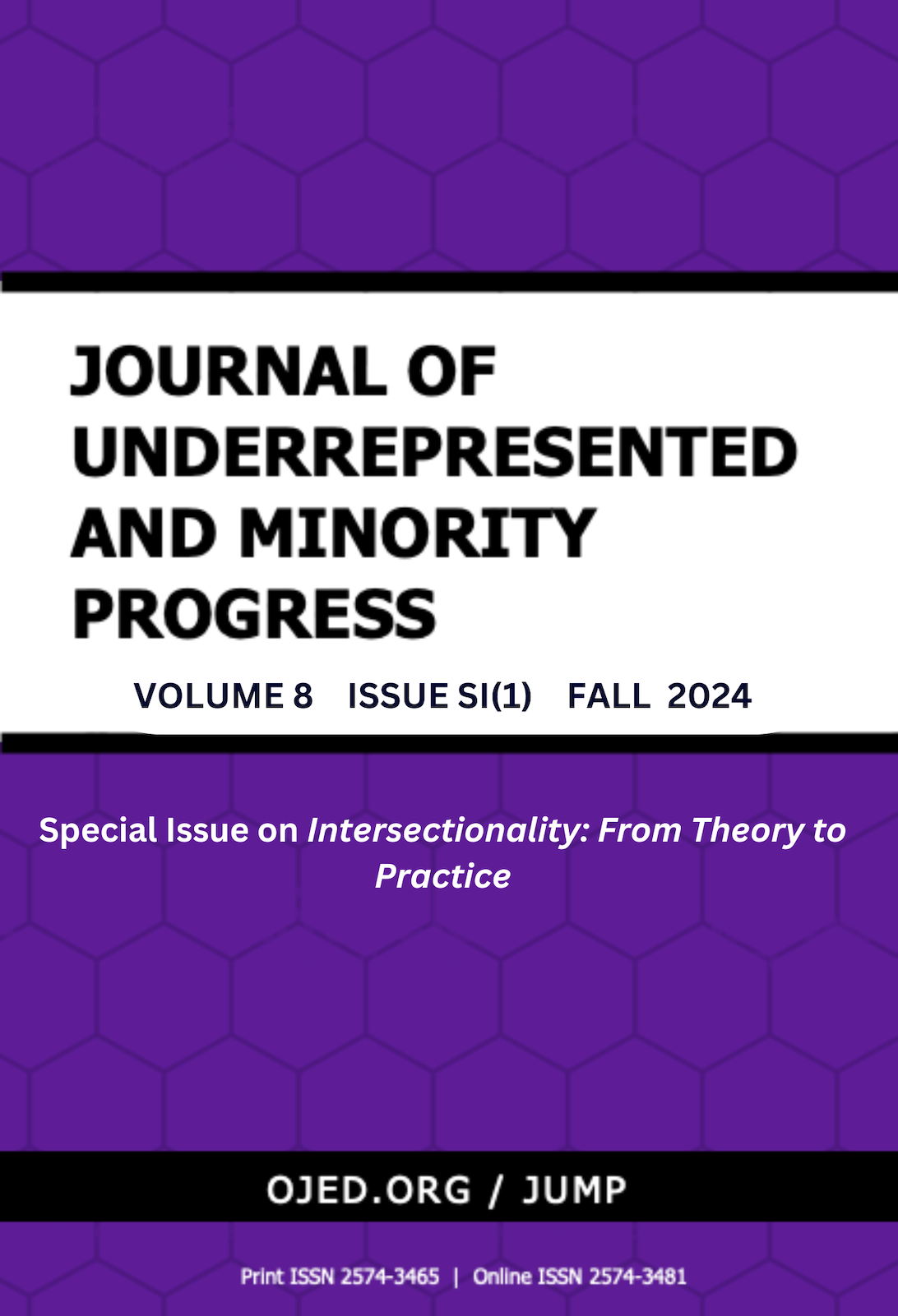Taking an Intersectional Approach: Immigrant Women Language Teachers’ Lived Experience of Identity
DOI:
https://doi.org/10.32674/wn99zd72Keywords:
skilled immigrants, women language teachers, intersectionality, gender, race, English as a second language, discrimination, overqualificationAbstract
This article explores skilled immigrant women language teachers’ lived experience of identity through an intersectional feminist lens. It examines how women teachers speak about themselves and their lives as immigrants and aims to understand the complex implications of identity and power relations by focusing on intersectional understanding of inequities. Data was generated through in-person and virtual individual interviews with six participants living and working across Canada. The findings revealed the following main challenges and ongoing barriers: discrimination, overqualification, financial limitations, a lengthy process of re-credentialing and professional reintegration, and insufficient government support. Furthermore, this study sheds light on how heteronormative frameworks pervade immigrant women’s personal and professional lives, intersecting with their identities vis-à-vis gender, race, ethnicity, country of origin, immigration status, and English as a second language. These categories collectively and individually present systemic barriers and sites of oppression that negatively impact an already marginalized minority group— internationally highly qualified immigrant women language teachers.
References
Beynon, J., Ilieva, R., & Dichupa, M. (2004). Re-credentialling experiences of immigrant teachers: Negotiating institutional structures, professional identities, and pedagogy. Teachers and Teaching, Theory and Practice, 10(4), 429–444. https://doi.org/10.1080/1354060042000224160
Block, D. (2017). Journey to the center of language teacher identity. In G. Barkhuizen (Ed.), Reflections on language teacher identity research (pp. 31–36). Routledge.
Carbado, D. W. (2013). Colorblind intersectionality. Signs: Journal of Women in Culture and Society, 38(4), 811–845. https://doi.org/10.1086/669666
Cervatiuc, A. (2009). Identity, good language learning, and adult immigrants in Canada. Journal of Language, Identity, and Education 8(4), 254–271. https://doi.org/10.1080/15348450903130439
Cho, S., Crenshaw, K. W., & McCall, L. (2013). Toward a field of intersectionality studies: Theory, applications, and praxis. Signs, 38(4), 785–810. https://doi.org/10.1086/669608
Crenshaw, K. (1989). Demarginalizing the intersection of race and sex: A black feminist critique of antidiscrimination doctrine, feminist theory, and antiracist politics. University of Chicago Legal Forum. Issue 1, Article 8, p. 138–167. https://doi.org/10.4324/9780429500480-5
Dagenais, D. (2020). Identities and language teaching in classrooms. In C. A. Chapelle (General Editor), The Concise Encyclopedia of Applied Linguistics (pp. 557–561). Wiley-Blackwell.
Dean, J. A., & Wilson, K. (2009). “Education? It is irrelevant to my job. It makes me very depressed.”: Exploring the health impacts of under/unemployment among highly skilled recent immigrants in Canada. Ethnicity & Health, 14(2), 185–204. https://doi.org/10.1080/13557850802227049
Donato, R. (2017). Becoming a language teacher professional: What’s identity got to do with it? In G. Barkhuizen (Ed.), Reflections on language teacher identity research (pp. 24–30). Routledge.
Gibb, T., & Hamdon, E. (2010). Moving across borders: Immigrant women’s encounters with globalization, the knowledge economy, and lifelong learning. International Journal of Lifelong Education, 29(2), 185–200. https://doi.org/10.1080/02601371003616616
Government of Canada. (2021). Eligibility to apply as a federal skilled worker (Express Entry). Retrieved from https://www.canada.ca/en/immigration-refugees-citizenship/services/immigrate-canada/express-entry/eligibility/federal-skilled-workers.html#selection.
Hadfield, J. (2017). Multiple selves, materials, and teacher identity. In G. Barkhuizen (Ed.), Reflections on language teacher identity research (pp. 252–257). Routledge.
Haraway, D., J. (1991). Simians, cyborgs, and women: The reinvention of nature. Free Association Books.
Higgins, C. (2015). Intersecting scapes and new millennium identities in language learning. Language Teaching, 48(3), 373–389. https://doi.org/10.1017/S0261444814000044
Hill Collins, P., & Bilge, S. (2016). Intersectionality. Polity Press.
Kubanyiova, M. (2017). Understanding language teachers’ sense-making in action through the prism of future self-guides. In G. Barkhuizen (Ed.), Reflections on language teacher identity research (pp. 100–106). Routledge.
Leibowitz, B. (2017). Language teacher identity in troubled times. In G. Barkhuizen (Ed.), Reflections on language teacher identity research (pp. 74–79). Routledge.
Matsuda, P. K. (2017). Second language writing teacher identity. In G. Barkhuizen (Ed.), Reflections on language teacher identity research (pp. 240–245). Routledge.
Mercer, S. (2017). Boundary disputes in self. In G. Barkhuizen (Ed.), Reflections on language teacher identity research (pp. 93–99). Routledge.
Ng, R., & Shan, H. (2010). Lifelong learning as ideological practice: An analysis from the perspective of immigrant women in Canada. International Journal of Lifelong Education, 29(2), 169–184. https://doi.org/10.1080/02601371003616574
Niyubahwe, A., Mukamurera, J., & Jutras, F. (2013). Professional integration of immigrant teachers in the school system: A literature review. McGill Journal of Education, 48(2), 279–296. https://doi.org/10.7202/1020972ar
Norton, B. (2013). Identity and language learning: Extending the conversation (2nd ed.). Multilingual Matters.
Norton, B. (2019). Identity and language learning: A 2019 retrospective account. The Canadian Modern Language Review, 75(4), 299–307. https://doi.org/10.3138/cmlr.2019-0287
Oda, M. (2017). Reflecting on my flight path. In G. Barkhuizen (Ed.), Reflections on language teacher identity research (pp. 222–227). Routledge.
Reitz, J. G. (2005). Tapping immigrants’ skills: New directions for Canadian immigration policy in the knowledge economy. Law and Business Review for the Americas, 11(3), 409–432.
Richards, J. C. (2017). Teacher identity in second language education. In G. Barkhuizen (Ed.), Reflections on language teacher identity research (pp. 139–144). Routledge.
Sadeghi, S. (2008). Gender, culture, and learning: Iranian immigrant women in Canadian higher education. International Journal of Lifelong Education, 27(2), 217–234. https://doi.org/10.1080/02601370801936382
Shan, H. (2009). Shaping the re-training and re-education experiences of immigrant women: The credential and certificate regime in Canada. International Journal of Lifelong Education, 28(3), 353–369. https://doi.org/10.1080/02601370902799150
Subedi, R. P., & Rosenberg, M. W. (2016). High-skilled immigrants—low-skilled jobs: Challenging everyday health. The Canadian Geographer/Le Géographe Canadien, 60(1), 56–68. https://doi.org/10.1111/cag.12237
Tomlinson, B. (2013). To tell the truth and not get trapped: Desire, distance, and intersectionality at the scene of argument. Signs: Journal of Women in Culture and Society, 38(4), 993–1017. https://doi.org/10.1086/669571
Walsh, S. C., Brigham, S. M., & Wang, Y. (2011). Internationally educated female teachers in the neoliberal context: Their labour market and teacher certification experiences in Canada. Teaching and Teacher Education, 27(3), 657–665. https://doi.org/10.1016/j.tate.2010.11.004
Yssaad, L., & Fields, A. (2018, December 24). The immigrant labour force analysis series. The Canadian immigration labour market: Trends from 2006 to 2017. Statistics Canada. https://www150.statcan.gc.ca/n1/pub/71-606-x/71-606-x2018001-eng.htm.


